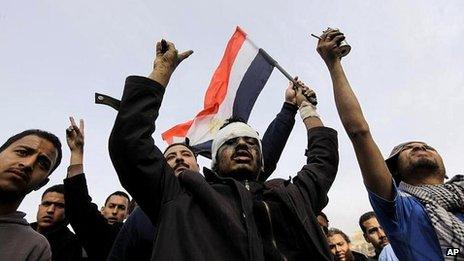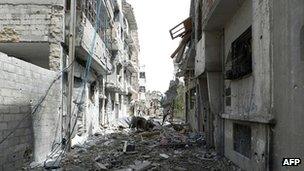Amnesty says actions did not match words in 2011
- Published

The report says profits and Realpolitik have been put ahead of the demands pro-democracy protesters in the Middle East - such as in Egypt
The courage shown by Middle-East pro-democracy protesters in 2011 has been matched by a failure of world leadership, says Amnesty International.
The UK-based human rights group says vocal support for protest movements shown by many global and regional powers has not translated into action.
Egypt was one example cited by Amnesty secretary-general Salil Shetty.
"The language of human rights is shelved when inconvenient or standing in the way of profit," says Mr Shetty.
"In the last year it has all too often become clear that opportunistic alliances and financial interests have trumped human rights as global powers jockey for influence in the Middle East and North Africa," adds Mr Shetty.
It looks increasingly, the human rights group suggests, as if the opportunities for change created by the protesters in Egypt are being squandered.
'Unfit for purpose'
Amnesty claims that a failure to intervene in Sri Lanka and inaction over crimes against humanity in Syria - one of Russia's main customers for arms - have left the United Nations Security Council looking redundant as a guardian of global peace.

Amnesty says the UN has betrayed Syrians by failing to protect protesters
"There is a clear and compelling case for the situation in Syria to be referred to the International Criminal Court for investigation of crimes against humanity," says Salil Shetty.
"The determination of some UN Security Council members to shield Syria at any cost leaves accountability for these crimes elusive and is a betrayal of the Syrian people."
He argues that in the past year "failed leadership has gone global, with politicians responding to protests with brutality or indifference".
Governments, he says, must show legitimate leadership and reject injustice by protecting the powerless and restraining the powerful.
And this failure of leadership, Amnesty suggests, "makes the UN Security Council seem tired, out of step and increasingly unfit for purpose".
'Self-interest and profit'
The human rights organisation also claims that the emerging powerhouses of India, Brazil and South Africa have too often been "complicit through their silence" in weakening the Security Council's influence as a guardian of global peace.
"Ousting individual leaders - however tyrannical - is not enough to deliver long-term change," Amnesty declares in the report. "Governments must uphold freedom of expression at home and abroad, take international responsibilities seriously and invest in systems and structures that ensure justice, freedom and equality before the law."
Amnesty says the UN meeting to agree an Arms Trade Treaty in July will be an acid test for politicians to place rights over self-interest and profit.
The report documents restrictions on freedom of speech in at least 91 countries as well as cases of people tortured or otherwise ill-treated in at least 101 countries.
But it concludes that 2011 was "a truly tumultuous year".
It says millions of people took to the streets to demand freedom, justice and dignity - some of them securing memorable victories.
- Published13 May 2011
- Published27 May 2010